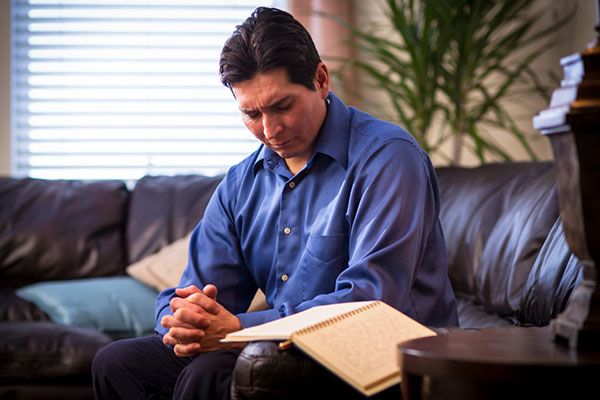Pray Like a Prophet, Part 2
June 21, 2017 • Blog Post
Here’s the second part of our two-part series on how to strengthen our prayers and connect more with God. In this post we will explore the hang-ups that keep us from praying. We hope that these quotes will shed light on why it sometimes feels like our prayers don’t get past the ceiling.
6) How Do I Get Revelation?
“President Lee, how do I get revelation?” asked a young Henry B. Eyring.
“He smiled,” President Eyring remembered. “I am glad he didn’t laugh, since it was an odd question to ask. But he answered my question with a story. It was essentially this. He said that during World War II he had been part of a group studying the question ‘What should the Church be doing for its members in the military service?’ He said they conducted interviews at bases up and down the country. They had data gathered. They had the data analyzed. They went back for more interviews. But still, no plan emerged.
“Then he gave me the lesson, which I now give to you, in about these words: ‘Hal, when we had done all we knew how to do, when we had our backs to the wall, then God gave us the revelation. Hal, if you want to get revelation, do your homework.’ . . .
“I bear you my solemn testimony that the Lord opens the heavens to his servants today. He will answer your prayers for help beyond your human understanding. But I also bear you my testimony that the words study it out mean a degree of patience, of labor, of persistence commensurate with the value of what you seek.” [Henry B. Eyring, “Waiting upon the Lord,” 30 September 1990]
7) What Should I Do When I Am Angry? Should I Still Pray?
“[Brigham Young brought] to the Lord concrete and urgent feelings, even hostile ones. His prize saddle was misplaced or did not hang properly, and the horse trampled it into shreds. He sharply rebuked the neglectful man and then made a beeline for the bedroom where he said (someone overheard him), “Down Brigham.” Then he knelt and prayed, ‘Lord, I’m sorry. I was angry. Take my anger away and help me to do better next time.’
‘When I am angry,’ he said to a friend, ‘the first thing I do is pray.’
“Some of us have been taught that should be the last thing we do, that we should soak our head in a bucket and then pray. “I never am so angry but that I can pray,” said Heber C. Kimball (JD 3:231). And as for the related emotions, the same holds true.” [Truman G. Madsen, “Souls Aflame: The Prayer Heritage of the Latter-day Saints,” 8 November 1983]
8) What If I Don’t Feel Like Praying?
“Listen to President Brigham Young’s counsel on the matter of praying even when we don’t feel like it or when earthly requests have not been satisfied.
It matters not whether you or I feel like praying, when the time comes to pray, pray. If we do not feel like it, we should pray till we do. . . . You will find that those who wait till the Spirit bids them pray, will never pray much on this earth. [DBY, p. 44]
“And he continues:
If I did not feel like praying . . . I should say, “Brigham, get down here on your knees, bow your body down before the throne of him who rules in the heavens, and stay there until you can feel to supplicate at that throne of grace erected for sinners.” [DBY, p. 46] [Marvin J. Ashton, “Know He Is There,” 10 November 1992]
9) What If I Sometimes Feel Like No One Is Listening?
“Have you ever knelt down alone and asked the Lord for something that is really important to you and then gotten up and found that your prayer wasn’t answered as you had hoped? I have. Have you ever prayed and prayed for days and days for something special and then found that it didn’t work out? I have. In times past, on more than a few occasions, I have gotten up off my knees and wondered in despair, ‘What’s the use—He isn’t even listening,’ or ‘Maybe I’m not worthy,’ or ‘Maybe I just don’t understand the signals.’ . . .
“ . . . I want you to know that I know that whenever one of Heavenly Father’s children kneels and talks to Him, He listens to each one. . . .
“Now, I also believe He answers us. I don’t believe He ignores His children when they talk to Him. The problem in our communication with the Lord is that not all of us have learned how to listen for His answers, or perhaps we are not prepared to hear Him. I believe we receive His answers as we prepare ourselves to receive them.” [H. Burke Peterson, “Prayer: Try Again,” 2 March 1980]
10) But, Does God Sometimes Not Answer Prayers?
“Very often over the years I have had peace and patience knowing that he was there and would not forsake me even though some prayers were going unanswered. What a joy and strength it would be in all of our lives to have the childlike faith and complete trust to know that he is there and that we can cry out unto him under all circumstances. . . .
“Perhaps it would be good for our souls to build the relationship and understanding that he is there, even our loving and eternal Father, and that ofttimes delays to our urgent pleas can be best for us. Who is to say it isn’t more important to know that he is there than to receive immediate answers? Oftentimes I think of the conditions under which Joseph Smith pled within the confines of horrible prison conditions. It appeared that his needs and pleas were justified as he was confined from his family, his Church, and his friends. He undoubtedly suffered intense mental as well as physical anguish. Answers appeared not to be the Lord’s way at that time. Nevertheless, Joseph seemed to be sustained by the overruling knowledge that God was there, knew him, and loved him. While answers to his pleadings and prayers were delayed, God was building a stronger prophet. . . .
“God was there, and he heard. But his purposes and timetables were and are eternal. Often we mortals misunderstand, and instead of answers there are sometimes delays, tests, and trying by fire.” [Marvin J. Ashton, “Know He Is There,” 10 November 1992]
11) Am I Vulnerable with the Lord?
“We need honest expression, but that only comes after careful self-inquiry and perhaps tears. Almost all revelation starts with a prophet crying unto the Lord, pleading, sometimes criticizing—not telling God what to do, but saying, ‘God, maybe I don’t understand very well. If you understood the situation the way I do, you would surely take action. Help me understand.’ The difference between counseling God and counseling with God is that when we counsel God, we tell him how he should run the Church or the world. When we counsel with him, we tell him how we feel, and then he responds after we trust him enough to have an honest relationship.” [J. Bonner Ritchie, “Taking Sweet Counsel,” 25 June 1991]




